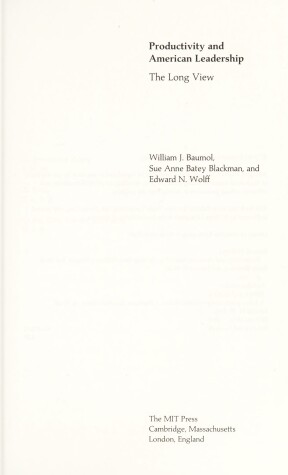MIT Press
4 total works
Productivity and American Leadership
by William J. Baumol, Sue Anne Batey Blackman, and Edward N. Wolff
Entrepreneurship, Management, and the Structure of Payoffs
by William J. Baumol
Baumol studies the effect of the allocation of entrepreneurs between productive and unproductive activities on an economy's performance.
Although it is admittedly difficult to theorize and make predictions on the innovative behavior and supply of entrepreneurs, William Baumol shows that by usually failing to incorporate entrepreneurship in their growth models, economists have omitted what can be a key contributor to economic growth. In this book Baumol seeks to bring entrepreneurship back into the body of mainstream economic theory. In particular, he studies the effect of the allocation of entrepreneurs between productive and unproductive activities on an economy's performance. Departing from the orthodox view that imitation retards technical progress by reducing the reward to innovation, Baumol asserts that entrepreneurs can spread and speed the adoption of new technology and ideas throughout a market. By persistently looking to depart from standard practices, entrepreneurs fuel change and help keep an economy from falling into a rut. Often these changes can improve efficiency, increase production, and spur growth. Baumol points out, however, that entrepreneurs do not always, or even usually, behave productively. He devotes several chapters to different types of misallocation of entrepreneurship, such as the mergers and acquisitions of the 1980s and frivolous lawsuits examples of the ways an entrepreneur will find to increase his or her share of the profits rather than produce more. Therefore, Baumol argues, it is important to the vitality of a free-enterprise society to provide incentives for making better use of entrepreneurial resources, and he suggests relevant changes in economic institutions.
With his characteristic acuteness and lucidity, William Baumol, one of America's foremost economists, tackles the problem of equity considerations in welfare economics by applying the novel "superfairness" criterion to the distribution of resources, product, income, and wealth that arises from economic decisions. Baumol extends the theory of fairness or equity in micropolicy beyond its more common technical analysis by exploring its applicability to a variety of practical and applied economic problems. He demonstrates that the tradeoff between fairness and efficiency in economic decision making does not have to be as great as generally believed, and he demonstrates a theory of fairness that provides economists with the analytic tools to make fairness analysis tractable. Superfairness covers a wide range of applications such as rationing, cross-subsidy pricing (as in telephone and utility services), predatory pricing, transfer payments and progressive taxation, wage negotiations, divorce settlements, and arbitration.
Competitiveness, Convergence, and International Specialization
by David Dollar and Edward N. Wolff
David Dollar and Edward Wolff look at claims that a deindustrialized United States is on the road to secondrate status in the global marketplace and find them to be both unfounded and simplistic. Their systematic and empirical investigation of the mechanisms through which countries like Japan and Germany have caught up with the United States in terms of productivity and standard of living will inform public debate about which government policies are likely to improve a nation's competitiveness. Looking at productivity convergence from the industry and subindustry level, Dollar and Wolff also examine questions of the relationship of productivity growth in individual industries to convergence of overall productivity in developed countries, the identification of industries crucial for aggregate productivity growth, the sources of productivity growth within industries, the relationship between international trade and productivity convergence, and whether the same mechanics of convergence are at work in developing countries. The authors' findings reveal, among other things, that the slowness of U.S. productivity growth relative to other nations is largely due to forces pushing for convergence of aggregate productivity levels. Although other countries have been catching up with the U.S., there is no evidence that they will surpass the US. or that the U.S. has deindustrialized. Perhaps most important, Dollar and Wolff find that countries catch up by raising their productivity levels in all manufacturing industries, not by large shifts of their employment and output from low- to high-value-added sectors. The growing similarity of advanced economies in terms of overall productivity masks a continued high degree of specialization in particular industries. Today different countries are the productivity leaders in different industries. Accordingly, the authors recommend that public policy focus on institutions and policies to promote innovation in general, rather than in key industries, and on free trade rather than protectionism.



